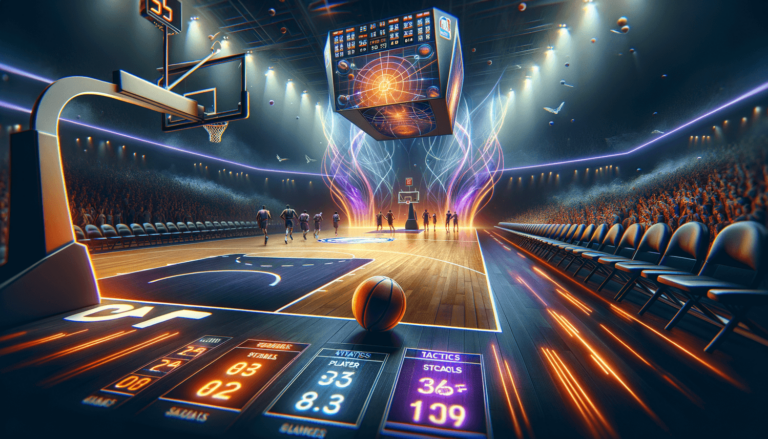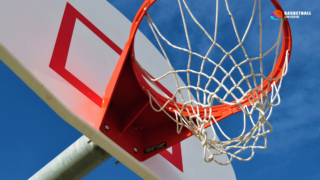
What Does DNP Mean in Basketball?
Written by: Basketball Universe
Last updated:

Welcome to the wonderful world of basketball jargon! Today, we dive deep into the rabbit hole to illuminate the mysterious term “DNP” that frequently pops up in the game’s stat sheets and broadcasts. Basketball aficionados and curious newbies alike will find answers to the enigma within this blog post. Buckle up and prepare for a journey into the heart of the sport, where you’ll uncover the meaning, significance, and various implications of DNP – guaranteeing you a courtside ticket to the land of basketball know-how!
What Does DNP Mean in Basketball?
In basketball, DNP stands for “Did Not Play,” which indicates that a player did not see any playing time during a specific game. Reasons for a DNP can range from a coach’s decision, injury, personal issues, or even league suspension. The stat sheet will often denote the specific reason, such as DNP-CD (Did Not Play – Coach’s Decision) or DNP-INJ (Did Not Play – Injured).
Delving into DNP: Different Types and Their Implications
While DNP in basketball may seem like a simple concept at first glance, there is more to it than meets the eye. The reasons behind a player receiving a DNP can be diverse, and understanding each type can enhance your overall comprehension of the game. In this section, we will explore the different types of DNPs and the implications they may have on a team’s performance and a player’s career.
DNP-CD (Did Not Play – Coach’s Decision)
One common type of DNP is DNP-CD, which stands for “Did Not Play – Coach’s Decision.” This designation means that a player did not participate in a game because the coach chose not to play them. A variety of factors can contribute to this decision, such as the player’s performance in practice, team dynamics, or match-up considerations for that specific game. It’s important to note that a DNP-CD is not necessarily an indication of poor performance, but simply a decision made based on the team’s need and strategy for that particular contest.
DNP-INJ (Did Not Play – Injured)
An injury can sideline a player and result in a DNP-INJ designation on the stat sheet. This type of DNP indicates that the player was unable to participate in the game due to injury or other health concerns. Injuries can have a substantial impact on a team’s overall performance, particularly when a key player is affected. Players sitting out with a DNP-INJ can be considered part of the team’s overall strategic planning, as coaches and medical staff work together to ensure a safe and timely return to play.
DNP-R (Did Not Play – Rest)
As the basketball season can be physically demanding, with numerous games played in quick succession, it’s not uncommon for a player to be given a night off for rest. A DNP-R, or “Did Not Play – Rest,” signifies that a player did not participate due to planned, scheduled rest. This type of DNP is typically pre-planned and may be applied to players who have recently recovered from an injury, played a significant number of recent games, or are aging veterans who need to manage their energy levels throughout the season.
DNP-PI (Did Not Play – Personal Issues)
Just like anybody else, basketball players may face personal challenges that require them to take time away from the game. The designation DNP-PI (“Did Not Play – Personal Issues”) conveys that a player did not participate in a game due to personal reasons. This can encompass anything from family emergencies, legal matters, or other pressing life events. While the causative factor might be private, it’s important to note that nobody is immune to life’s difficulties, and sometimes the game takes a backseat to such challenges.
DNP-SUS (Did Not Play – Suspended)
DNP-SUS, or “Did Not Play – Suspended,” indicates that a player was unable to participate due to league suspension. Reasons for suspensions can vary but may include violations of league policies, such as drug-use, fighting, or unsportsmanlike conduct. Suspensions can carry a wide range of consequences, including lost playing time, monetary fines, or damage to a player’s reputation. Depending on the nature of the suspension, it can have ripple effects on a team’s on-court performance, roster moves, and even team morale.
Impact of DNP on Player Development and Career Trajectory
As a basketball fan or aspiring player, you may wonder what purpose DNPs serve and how they can affect a player’s development and career trajectory. In some cases, DNPs can have a negative impact on a player’s momentum, leading to stagnation in skill development or even a decline in performance. However, DNPs can also lead to growth opportunities, as players fight for their place in the rotation or reinvent their game to better suit their team’s needs. Let’s examine how DNP designations can contribute to both challenges and opportunities in a player’s development.
The Struggle to Find Consistent Playing Time
For players who frequently receive DNPs, finding consistent playing time can be an uphill battle. In many instances, these players get limited opportunities to showcase their skills during games, making it difficult to build on-court chemistry with their teammates or develop confidence in their abilities. The resulting inconsistency in playing time can hinder a player’s overall growth and negatively impact their career prospects.
Resilience and Adaptation
On the flip side, facing a DNP designation can also help players become more resilient and adaptable. Being benched often forces players to reevaluate their skillsets, identify areas for improvement, and double down on their efforts during practice. DNPs can act as a wakeup call, motivating players to put forth maximum effort and avoid complacency. In some cases, players may completely reinvent their game by incorporating new skills, changing their physical conditioning, or assuming different on-court roles to better serve the team.
The Importance of Mental Strength
One often-overlooked aspect of dealing with DNPs involves the cultivation of mental strength. For players who were once stars in high school or college, DNPs can be a humbling experience. Being able to cope with the emotional ups and downs of bench life is essential in maintaining a positive outlook and a healthy approach to the game. Basketball players must learn to remain engaged during games, support their teammates, and be prepared to deliver when an opportunity arises.
Key Takeaways for Coaches and Fans
As we delve deeper into the world of DNPs, it’s essential to understand that, just like any other aspect of basketball, DNPs are an important component of the sport. There are significant takeaways for both coaches and fans alike, granting valuable insights into the game’s nuances, player development, and team dynamics.
Utilizing Every Player
Coaches should be mindful of the potential impact of DNP designations on their players’ development, team chemistry and overall performance. By providing meaningful playing time and opportunities for growth to every player on the roster, coaches can help players feel valued and motivated, leading to an engaged and close-knit team. Each player, even those who receive DNPs, should be considered an integral part of the team’s success.
Appreciating the Value of Depth
Basketball fans often focus on star players, but it’s crucial to remember the importance of having depth on the team’s roster. Players who may not receive consistent playing time can still provide valuable contributions when called upon, filling in due to injuries, rest, or other restrictions that impact the rotation. Embracing this depth and recognizing the potential of every player will lead to a better understanding of the game and an appreciation for the challenges and rewards of team sports.
Final Thoughts on DNP in Basketball
As we’ve covered the various types of DNP designations and explored their implications within the realm of basketball, it has become clear that DNPs play a significant role in the sport. By understanding the meaning behind different DNPs, the process of player adaptation, and their impact on team performance, we can derive valuable insights and enjoy a more in-depth, comprehensive view of the game we all love. With this newfound knowledge, next time you come across the phrase “DNP” on a stat sheet or broadcast, you can appreciate the full story behind it and continue to grow as a true basketball aficionado.
Understanding DNPs in the Context of Player Rotations
Player rotations play an essential role in basketball, as coaches must manage their rosters strategically to ensure success on the court. A deep understanding of DNPs is vital in grasping the intricacies of player rotations and how coaches make decisions based on players’ availability, matchups, and other factors. In this section, we will explore deeper into the context of player rotations and the impact of DNPs.
Starters, Bench Players, and the End-of-Bench Role
Coaches typically divide their roster into three categories: starters, bench players, and end-of-bench players. Generally, starters are the most consistent contributors and play the bulk of the minutes. Bench players fill in as needed, either for intermittent rest or to provide a spark off the bench. End-of-bench players typically receive DNPs, and their situations can be temporary, tied to matchups or skill development, and these players often see less time on the court.
Player Matchups: A Key Consideration for DNPs
One aspect of player rotations requiring special attention is matchups, as they can play a significant role in a coach’s decision to assign DNPs. Specific players may receive DNPs when their skills and attributes do not align well with the opposing team’s lineup. For example, a slower, less agile big man might receive a DNP if facing a fast-paced, perimeter-oriented team. These matchup considerations may change game-to-game, which can lead to fluctuations in playing time and DNPs for certain roster members.
Emergencies and In-Game Adjustments: Staying Ready
Another important factor to consider when understanding DNPs is in-game adjustments and emergencies. In the world of basketball, injuries, foul trouble, or poor performance can necessitate adjustments to the planned player rotations. Players that might typically receive DNPs must always be prepared to step up and contribute during these instances. Maintaining mental preparedness despite the possibility of DNPs demonstrates an essential aspect of professionalism and teamwork in the world of basketball.
The DNP Mindset: What Players Can Learn From the Experience
While being assigned a DNP could be a disappointing experience, players can glean valuable lessons from this designation. We will discuss what players can learn from DNPs and the mindset required to overcome the obstacles they may face as a result.
Embracing the Challenge and Staying Positive
Being confronted with DNPs can be challenging for any player, but it’s essential to embrace the situation and maintain a positive outlook. Players must develop a strong work ethic and be determined to improve their game while also understanding that their time to shine may come when least expected. Building a resilient mindset will help them stay focused on their goals and contribute to the team’s success whenever they may be called upon.
Seeking Opportunities to Learn and Grow
Players experiencing DNPs should actively seek opportunities to learn and grow from the situation. Watching games from the sidelines can provide a unique perspective, helping players to identify nuances in the game, spot weaknesses in the opponent’s strategies, and support their teammates with valuable insights. Being proactive in seeking feedback from coaches, studying game film, and learning from teammates can help them transform DNPs into opportunities for growth.
Utilizing Practice as a Proving Ground
One invaluable asset for players who receive DNPs is practice, as it provides an opportunity to showcase skills, work ethic, and determination. Players should view practice as a proving ground, where they can demonstrate their dedication to improvement and potentially earn future playing opportunities. By dedicating themselves during practices and consistently pushing their limits, players can reshape their on-court roles and help change their team’s perception of their capabilities.
The Evolution of a Player’s Role: From DNP to Key Contributor
While DNPs can represent a temporary setback in a player’s career, they need not define their entire journey. The world of basketball is replete with examples of players who evolved from being regular recipients of DNPs to key contributors on their respective teams. In this closing section, we will examine the importance of perseverance, patience, and growth in the context of revolutionizing a player’s role and career outlook.
Examples of Success Stories
Many successful basketball players have experienced DNPs early in their careers, only to emerge as key contributors later on. One notable example is NBA player Fred VanVleet, who went undrafted and spent much of his rookie season receiving DNPs. Despite these challenges, VanVleet worked tirelessly to earn a spot in the rotation and eventually became an integral part of the Toronto Raptors’ 2019 NBA Championship team. Stories like VanVleet’s demonstrate how commitment, hard work, and a never-give-up attitude can lead to success, even in the face of DNPs.
The Long Road to Success
It’s important to remember that the road to success is often long and winding, and DNPs represent just one facet of a player’s overall journey. Through hard work, dedication, and a positive mindset, the negative aspects of DNPs can be transformed into growth opportunities and catalysts for improvement. With perseverance, patience, and continuous personal growth, today’s DNP recipients can become tomorrow’s success stories.
Frequently Asked Questions (FAQ) Section
Are you still curious and hungry for more information about DNPs in basketball? We’ve compiled a list of frequently asked questions to help clarify any lingering doubts or queries related to the topic. Feel free to browse through these questions and their respective answers to enhance your understanding!
1. What is DNP short for in basketball?
DNP stands for “Did Not Play” in basketball. It indicates that a player did not participate in a game for various reasons, such as a coach’s decision, injury, personal issues, or league suspension.
2. How is a DNP different from a DNS?
A DNP (Did Not Play) is different from a DNS (Did Not Start). While a DNP signifies that a player didn’t participate in a game at all, a DNS indicates that the player came off the bench and did not start the game but still played.
3. Are DNPs common in basketball?
Yes, DNPs are common in basketball, particularly for end-of-bench players who do not regularly receive playing time. DNPs can also occur due to injuries, coach’s decisions, rest schedules, or personal issues.
4. Can DNPs hurt a player’s career?
DNPs may initially hinder a player’s progress, but they can also motivate them to work harder and improve their skills. Many players have successfully turned DNPs into growth opportunities and ultimately emerged as vital contributors on their teams.
5. How do DNPs affect team performance?
DNPs can impact team performance in multiple ways. Injured players temporarily receiving DNPs can impact the team’s chemistry and game plan, while DNPs based on coach’s decisions signify roster depth and the ability to rely on multiple players throughout the season.
6. What happens when a player gets a DNP?
When a player gets a DNP, they do not participate in the game for its entirety. They sit on the sideline or in the locker room, depending on the reason for the DNP, and support their teammates while not accruing any on-court statistics.
7. Do players still get paid if they receive a DNP?
Yes, players still get paid their full salary, regardless of whether they receive a DNP for a game. However, repeated DNPs may impact a player’s future contracts and earning potential if they cannot establish themselves in the rotation or improve their game.
8. Can a DNP impact a player’s position in the team’s rotation?
A DNP can sometimes reflect a change in a player’s position within the team’s rotation. However, it may also be assigned due to other factors, such as injuries, rest, or personal issues, without directly affecting the player’s long-term role on the team.
9. Does a DNP affect individual player stats?
A DNP does not directly affect a player’s stats, other than listing them as receiving a DNP on the stat sheet for that game. Since they do not participate in the game, they have no statistical output. However, DNPs can indirectly affect season or career averages if a player experiences an extended period of non-participation.
10. Can a DNP help a player develop?
While a DNP may not seem beneficial at first, it can potentially challenge and motivate players to work harder on their skills and overall game. Players who receive DNPs can learn from watching the game, studying film, and seeking feedback from their coaches to improve.
11. How can coaches utilize DNPs effectively?
Coaches can utilize DNPs effectively by managing their roster strategically and ensuring players receive meaningful playing time. Even when players receive DNPs, coaches should focus on maintaining their development, engagement, and sense of value within the team.
12. How do players stay mentally prepared in case of DNPs or limited playing time?
Players must maintain a strong work ethic, focus on improvement, and remain engaged during practice and games. A positive attitude, preparedness, and the willingness to contribute whenever called upon are essential for coping with the challenges associated with DNPs or limited playing time.
13. Do players ever play after initially being assigned a DNP?
Yes, players initially assigned a DNP may still end up playing if a need arises during the game, such as injuries, foul trouble, or poor performance by other players. It’s crucial for players who typically receive DNPs to stay prepared and ready to contribute when the opportunity arises.
Featured Posts
- No pillar pages found.




